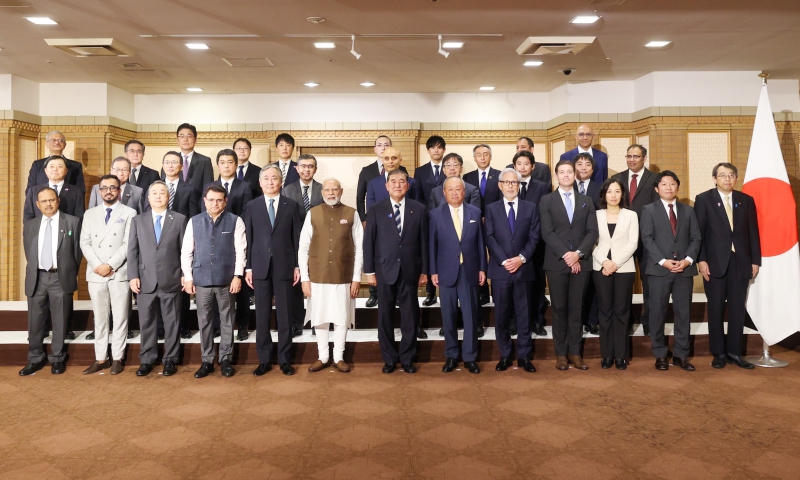
The India–Japan Special Strategic and Global Partnership has entered a transformative phase in 2025, with the two nations deepening cooperation in the fields of economic security, defense, and emerging technologies. Anchored in shared democratic values, a rules-based order, and complementary strengths, this partnership has become vital to ensuring resilience, stability, and growth in the Indo-Pacific and beyond.
Strengthening the Economic Security Framework
The launch of the India–Japan Dialogue on Economic Security including Strategic Trade and Technology in November 2024 marked a new institutional platform for collaboration. Chaired at the Vice Foreign Minister/Foreign Secretary level, this dialogue reflects the convergence of political trust, economic imperatives, and security outlooks of both sides.
India and Japan have agreed to:
- Build resilient supply chains for critical goods,
- Protect key and emerging technologies,
- Secure critical infrastructure, and
- Promote public–private partnerships in strategic sectors.
Industry platforms such as CII, Keidanren, JETRO, and JCCII play a central role in advancing the Joint Action Plan on Economic and Security Cooperation.
Priority Sectors of Cooperation
Semiconductors
Semiconductors have emerged as a cornerstone of bilateral cooperation.
- MoC on Semiconductor Supply Chain Partnership (2023) established policy foundations.
- Renesas Electronics set up an OSAT facility in Gujarat with CG Power and signed MoUs with C-DAC under the Chips to Startup (C2S) program.
- Renesas also partnered with IIT Hyderabad for research in VLSI and embedded systems.
- Tokyo Electron and Tata Electronics launched a strategic partnership to build a semiconductor ecosystem in India.
- Both nations cooperate closely in the Quad Semiconductor Supply Chains Contingency Network.
Critical Minerals
- A MoC on Mineral Resources was signed in August 2025.
- Collaboration includes Toyota Tsusho’s rare earth refining project in Andhra Pradesh.
- Joint efforts continue under the Quad Critical Minerals Initiative and the Mineral Security Partnership.
ICT and Digital Technology
- Open RAN pilot projects backed by Japan’s MIC.
- NEC and Reliance Jio cooperate on 5G and Open RAN infrastructure, supported by NEC’s Centre of Excellence in Chennai.
- NTT is expanding its data centre network in India with financing from JBIC and JICT.
- The Digital Partnership 2.0 (2025) renewed focus on semiconductors, AI, digital public infrastructure, and startups.
Clean Energy
- The 11th India–Japan Energy Dialogue (2025) and Joint Crediting Mechanism (JCM) highlight commitment to decarbonization.
- Agreements include:
- Clean Hydrogen and Ammonia MoU,
- Ammonia co-firing project at Mundra (IHI, Kowa, Adani Power),
- JBIC–Osaka Gas partnership with Clean Max on renewable energy in Karnataka.
- Cooperation extends to biofuels under the Global Biofuels Alliance.
- A major JPY 60 billion loan was signed to support bamboo-based bioethanol production in Assam.
Pharmaceuticals and Biotech
- A MoC between India’s CDSCO and Japan’s MHLW strengthens regulatory cooperation.
- The Biopharma Alliance enhances supply chain resilience.
- AMED, DST, and ICMR will collaborate on medical and health research.
- JBIC provides financial support for Japanese SMEs in pharma and chemicals in India.
Science, Technology, and Innovation (STI)
The year 2025 has been designated the Year of Science, Technology and Innovation Exchanges.
- The 11th Joint Committee Meeting on S&T (June 2025) prioritized cooperation in AI, quantum, biotechnology, climate change technologies, and space.
- The India–Japan AI Cooperation Initiative promotes joint AI research, including Large Language Models (LLMs).
- Ongoing projects include Vehicle-to-Everything (V2X) technology demonstrations and Intelligent Transport Systems.
- SICORP joint calls between DST and JST support collaborative R&D.
- India and Japan also advance cooperation in space through the LUPEX mission and space situational awareness.
- Talent exchanges thrive through the LOTUS programme, Sakura Science Exchange, and academic-industry internships.
- Major investment: NTT DATA + Neysa Networks + Telangana Govt are setting up an AI data centre cluster in Hyderabad worth ₹10,500 crore.
Expanding Security Cooperation
Alongside economic security, the Joint Declaration on Security Cooperation (2025) reaffirms India–Japan defense partnership.
Defense & Military
- Increasingly complex bilateral exercises and tri-service coordination.
- Collaboration between special operations forces.
- Use of the Reciprocal Provision of Supplies and Services Agreement for logistics.
- Cooperation in niche areas: counter-terrorism, cyber defense, peacekeeping, and CBR defense.
Maritime Security
- More frequent port calls and naval visits.
- Enhanced situational awareness via IFC-IOR and IPMDA.
- Stronger law enforcement cooperation against piracy and transnational crimes at sea.
- Disaster resilience and humanitarian coordination through multilateral platforms.
Technology & Defense Industry
- Co-development and co-production under Defense Equipment and Technology Cooperation.
- Collaboration between DRDO and ATLA in defense R&D.
- Cooperation on critical minerals for defense industries.
- Industry engagement, including MSMEs and startups, in defense technology.
Global & Regional Coordination
- Joint commitment to a Free and Open Indo-Pacific (FOIP) and ASEAN centrality.
- Alignment with India’s Indo-Pacific Oceans Initiative.
- Support for UNSC reform, including each other’s candidature as permanent members.
- Joint stance against terrorism, nuclear proliferation, and economic coercion.
- Deepened coordination within the Quad framework.
India and Japan today stand at the forefront of shaping the strategic and economic architecture of the Indo-Pacific. From semiconductors to clean energy, from maritime security to AI, the two nations are laying down comprehensive frameworks that blend economic resilience with defense preparedness.
This next chapter in the India–Japan partnership is not only about strengthening bilateral ties, but also about ensuring peace, stability, and prosperity across the Indo-Pacific and the wider global order.
Source: PMO
